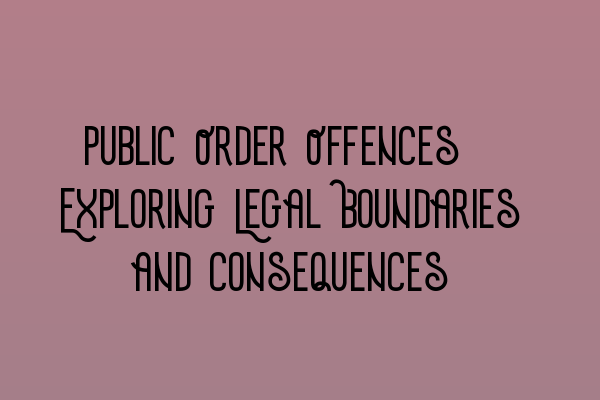Public Order Offences: Exploring Legal Boundaries and Consequences
In today’s society, maintaining public order is crucial for a harmonious coexistence. Public order offences encompass a wide range of behaviors that disrupt or disturb the peace and tranquility of the general public. Understanding the legal boundaries surrounding these offences, as well as their potential consequences, is vital for both legal professionals and the general public alike.
What are Public Order Offences?
Public order offences refer to a category of crimes that involve actions or conduct likely to cause harassment, alarm, or distress to others. These offences can take various forms, including but not limited to:
- Disorderly conduct in public places
- Threatening, abusive, or insulting behavior
- Obscene or offensive gestures or language
- Rioting, affray, or violent disorder
- Trespassing
Each of these offences has its own legal elements and requirements that must be met for a conviction to occur. It is, therefore, essential to consult legal professionals who specialize in criminal law to navigate the complexities of public order offences.
The Legal Boundaries
Public order offences are governed by legislation, such as the Public Order Act 1986 in the UK. This act outlines the various offences, their definitions, and the corresponding penalties. Legislation may vary depending on the jurisdiction, so it is crucial to consult the specific legal framework applicable to your case.
For example, disorderly conduct in a public place typically involves engaging in behavior that causes or is likely to cause harassment, alarm, or distress to others. The intention behind such behavior plays a significant role in determining guilt. Similarly, threatening or abusive behavior requires proof of intent to cause alarm or distress.
The legal boundaries of public order offences are constantly evolving through court judgments and interpretations. Staying updated on recent case law and legal precedents is essential for legal professionals involved in cases related to public order offences.
Consequences of Public Order Offences
Convictions for public order offences can have severe consequences, including:
- Criminal records
- Fines
- Community service
- Probation
- Imprisonment
The specific consequences depend on the severity and nature of the offence committed, as well as the defendant’s previous criminal record. Magistrates or judges have discretion in determining the appropriate penalty, taking into account various factors, such as the defendant’s intentions, the impact on public order, and any mitigating or aggravating circumstances.
Legal professionals who specialize in criminal law play a crucial role in defending individuals accused of public order offences. Their expertise in navigating the legal complexities and mounting an effective defense is invaluable in ensuring fair outcomes for their clients.
Seeking Legal Assistance
If you or someone you know is facing charges related to public order offences, it is essential to seek legal assistance promptly. Consulting a qualified solicitor who specializes in criminal law can significantly impact the outcome of your case.
At SQE Criminal Law & Practice Law UK, we offer comprehensive legal services for individuals facing criminal charges, including public order offences. Our team of experienced solicitors is committed to providing the highest level of representation and guiding our clients through every step of the legal process.
For further assistance or to learn more about criminal law and practice, we recommend checking out our related articles below:
By staying informed and availing yourself of quality legal services, you can effectively navigate the complexities of public order offences and achieve the best possible outcome for your case.
